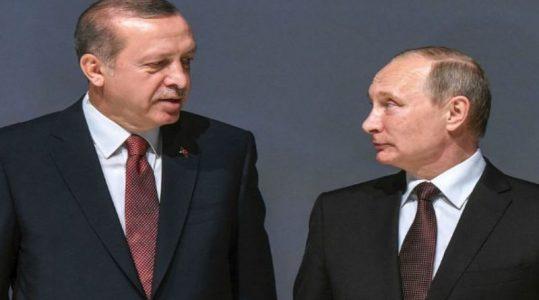
Russia blames Turkey that Al-Qaeda terrorists gained control of most of Syria’s Idlib
Moscow’s acknowledgment of the group’s influence in Idlib is a testament to what experts believe is the jihadi organization’s status as the most potent al-Qaeda branch and overall terrorist group in Syria.
In August 2017, the U.S. State Department warned of “grave consequences” if the al-Qaeda linked Hayat Tahrir al-Sham (HTS) group conquered Idlib.
The American Enterprise Institute (AEI) warned in July 2017 as the jihadis were consolidating their control of the province that the al-Qaeda-linked group had evolved and grown stronger in Idlib, where it has set the conditions to establish an Islamic emirate, courtesy of the U.S.-led international coalition’s single-minded focus on defeating the Islamic State (ISIS/ISIL).
The al-Qaeda offshoot is now the strongest group in Syria and the most potent branch of the international jihadi organization behind the 9/11 attacks, and the Turkey-Russia deal has failed to restrain the group.
Ahead of the Vladimir Putin-Recep Tayyip Erdogan talks, Maria Zakharova, a Russian Foreign Ministry spokeswoman, conceded that Idlib was descending into chaos, echoing Putin, who added later on Wednesday, “Unfortunately there are many problems there and we see them.”
“The situation taking shape around Idlib is a cause for serious concern. The situation in this de-escalation area is rapidly deteriorating,” Zakharova said.
The ceasefire zone has “essentially been taken under the full control of militants from the al-Nusra alliance, Hayat Tahrir al-Sham, through the ousting of moderate armed opposition units,” she said, adding that 65 people had been killed and more than 200 injured in an excess of 1,000 recorded breaches of the four-month ceasefire.
“In the past few weeks, other armed opposition groups have signed agreements ceding administrative authority to HTS, after it forced them out of several towns in the final rebel-held bastion,” a move that brings the jihadis closer to the Assad forces trying to remove them, Financial Times (FT) added.
During the Putin-Erdogan meeting in Moscow on Wednesday, the two leaders reportedly again vowed to stabilize Idlib after their mutual efforts to do so failed to rein in HTS as part of a pact reached between the two countries in September 2018.
“Unfortunately, there are still a lot of issues there [in Idlib]; both we and our Turkish counterparts see that,” Putin said hours after meeting with his Turkish counterpart in Moscow on Wednesday. “Mr Erdogan and I have agreed on the ways to remedy this.”
“Our defense ministers have held additional consultations … We will seek for all of our agreements to be fulfilled. We share common convictions that we should jointly continue the fight against terrorists, no matter where they are staying, including in the Idlib area,” Putin added.
In September 2018, Russia and Turkey agreed to establish a failed buffer zone in Idlib, free of jihadis and their weapons.
Although dictator Bashar al-Assad’s ally, Russia and pro-Syrian rebel Turkey, are on opposing sides of the Syrian war, which has been raging since March 2011, the two countries have worked together on trying to end the conflict.
Under the September agreement, Turkey reportedly agreed to push the most extremist groups out of Idlib while Russia attempted to restrain Assad from attacking the area, a move that some analysts warned would have triggered a humanitarian crisis in region crammed with an estimated three million people, including some of Turkey’s rebel allies.
The purpose of the Turkey-Russia Idlib deal was to avert a scheduled military assault on the province by Moscow and Tehran-backed Assad in exchange from assurances from Turkey to push out the jihadis.
Now, Russia is reportedly accusing Turkey of failing to push the predominantly HTS jihadis from the region.
Russia has called for new measures to hunt down extremist groups in Syria’s Idlib after accusing Turkey of failing to live up to a promise to clear the opposition stronghold of militants. President Vladimir Putin told his Turkish counterpart during crunch talks in Moscow that they must fight terrorists “wherever they are,” after Russian officials admitted that a ceasefire [between jihadis] agreement around Syria’s last rebel-held stronghold had failed.
It is unclear how Russia and Turkey will be able to tell the al-Qaeda-linked jihadis from other Ankara-allied rebels, all of whom are considered terrorists by the Syrian regime.
“We believe that our support for the agreed cessation of hostilities should not supersede our efforts in fighting terrorism, which must be continued,” Putin explained, adding that new initiatives would target jihadis inside the city.
“We will continue to combat terrorist organizations as we have in the past. This is a protracted fight. It cannot be done overnight,” Erdogan added, seemingly trying to allay Russia’s concerns.
Under the deal, the Russian and Turkish militaries were supposed to monitor the demilitarized zone.
Citing several analysts, Fox News noted that Erdogan’s focus on pushing the U.S.-allied Syrian Kurds out of territory bordering Turkey had rendered Ankara incapable of addressing the al-Qaeda threat in Idlib.
According to a Center for Strategic and International Studies (CSIS) analysis, HTS has between 12,000 and 15,000 fighters and is the most dominant of all rebel groups operating in Syria.
Formerly known as al-Nusra Front and Jabhat Fateh al-Sham, HTS claims to have cut its allegiance with al-Qaeda, but several experts have dismissed the claim as deceptive.
Source: Breitbart





